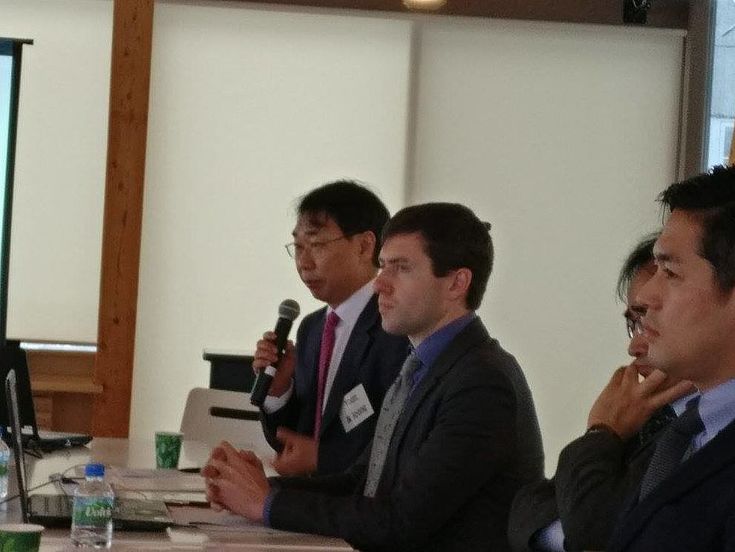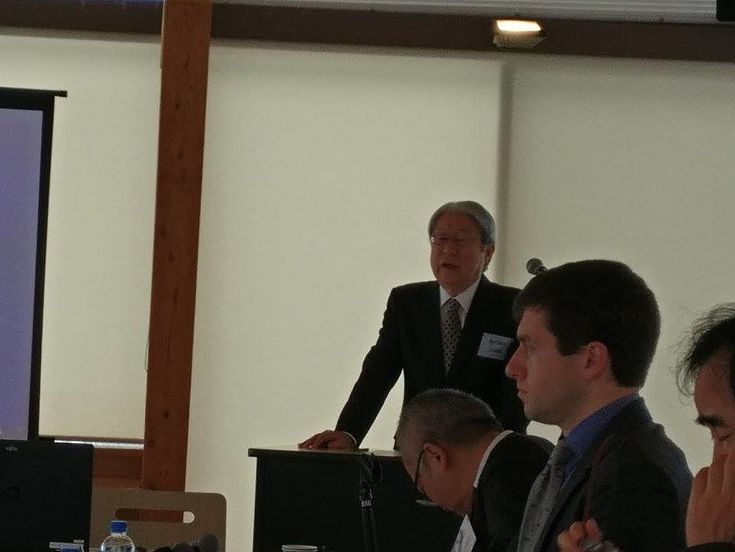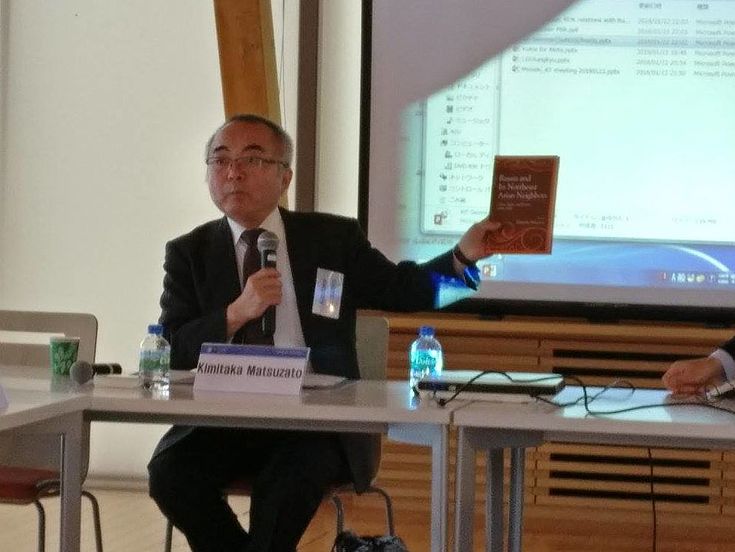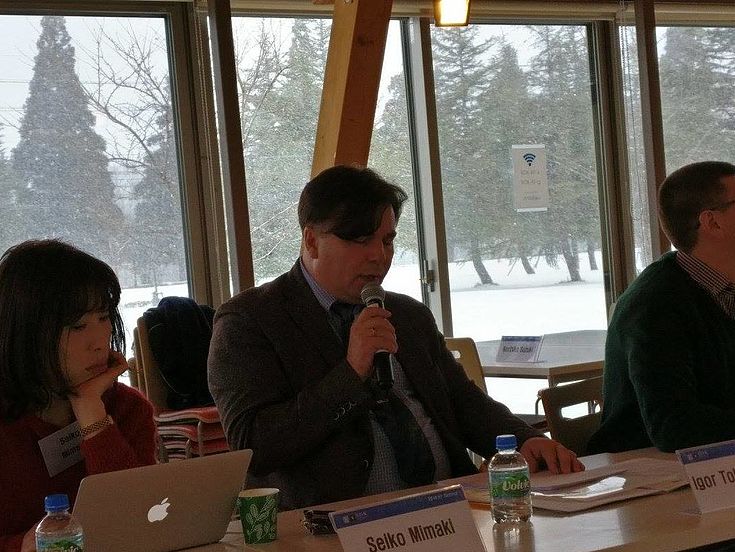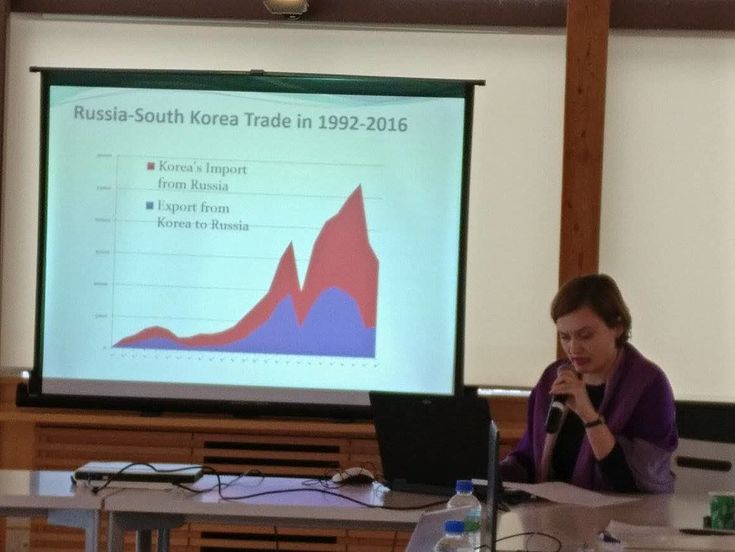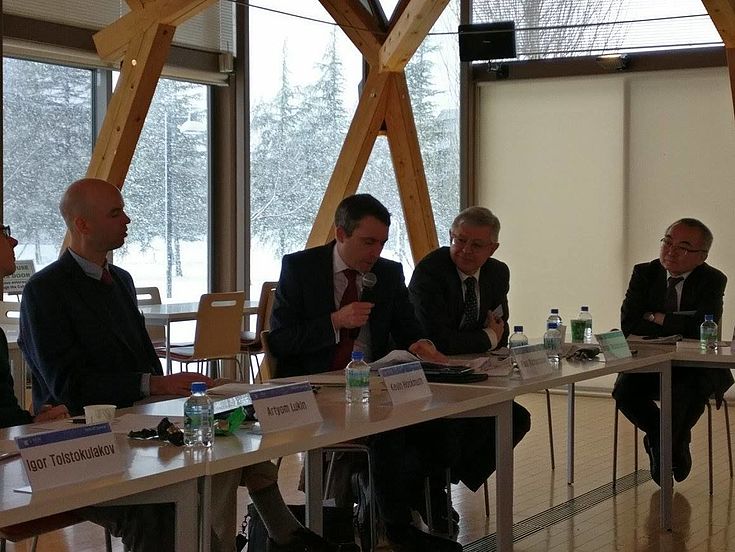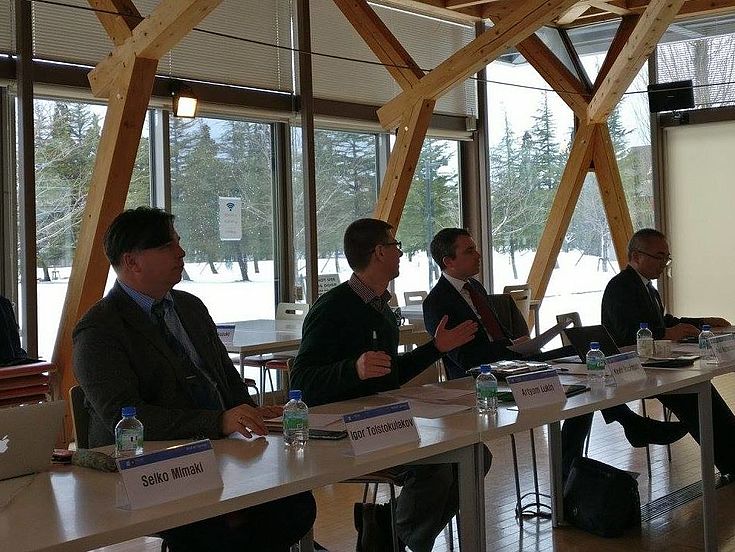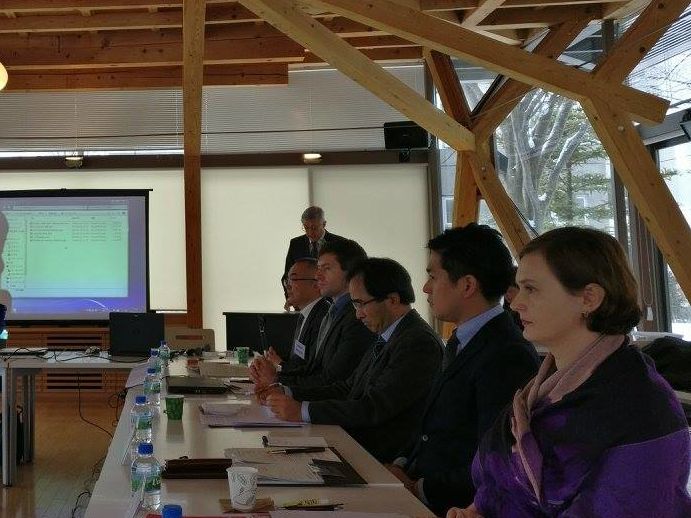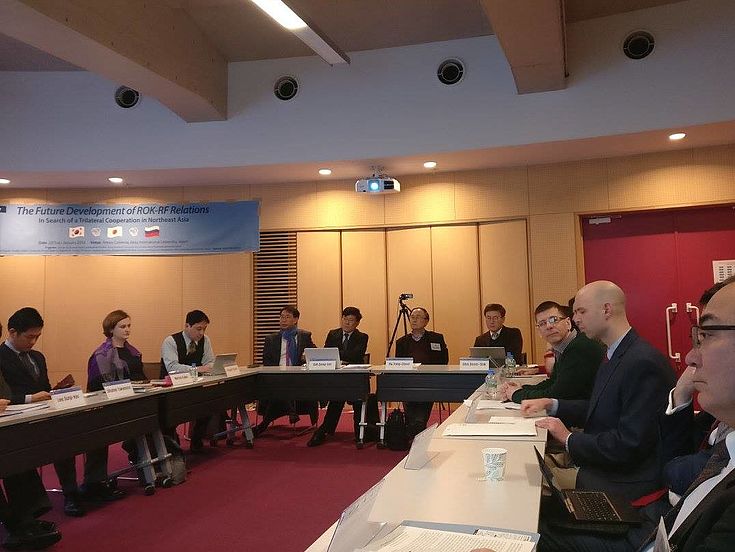Conference on the Future Development of South Korean-Russian Relations
In Search of Trilateral Cooperation in Northeast Asia
Project director Prof. Youn Ikjoong of Hallym University Korea.
HSS
Project for peaceful and fruitful cooperation
In this situation, the Institute of Russian Studies of Hallym University of Graduate Studies and the Center for Eurasian and Central Asian Studies of Seoul National University, the Center for Asia-Pacific Studies of the Far Eastern Federal University of Russia and the Institute for Asian Studies and Regional Collaboration of Akita International University carried out a policy-oriented research project between Korea and Russia, funded by Korea Foundation, to explore pathways of peaceful and fruitful cooperation between both countries and within the region.
As part of this research project, on January 23 2018 in Akita International University, a whole-day workshop of leading scholars of Russia, Japan and the Republic of Korea was held to further discussion of these questions. The project directors Prof. Youn Ikjoong of Hallym University of Graduate Studies as well as Prof. Sergei Sevastianov of the Far Eastern Federal University of Russia in Vladivostok brought together leading scholars debating the future of relations in Northeast Asia.
In his congratulatory speech, the President of Akita International University, Prof. Norihiko Suzuki, stressed the aim of Akita International University to become ever more integrated within the Northeast Asian region.
HSS
Look beyond the current nuclear crisis
The conference was opened with remarks by conference director Prof. Youn and co-director Prof. Sevastianov.
The keynote speech was provided by Prof. Yong-Chool Ha of the University of Washington, USA. He took a look at the North Korean Nuclear Issue and Challenges for the Future of Northeast Asia. He urged participants to look beyond the current nuclear crisis to challenges for North Korea from the economy and conflicts within the country. These would soon become more prevailing, after the superficial unity brought about by the nuclear issue would crumble. At the same time, the nuclear crisis would be meaningful for the Northeast Asian region, where already now it would bring about more cooperation.
Prof. Kimitaka Matsuzato (University of Tokyo), who recently published a monograph on international relations in Northeast Asia in historical perspective, chaired the first session.
HSS
Critics for Existing Problems of ROK-RF Relations
The first paper of the first session was a view on the North Korean nuclear issue and THAAD by Dr. Dong-Joo Suh of the Institute for National Security and Strategy, a leading South Korean think tank related to its intelligence services.
Dr. Suh looked at various issues affecting the relation of Russia and Korea, partly being of common interest (like economic development of the Russian Far East), and partly of opposed interests (like THAAD). Key to solving the problems in the relation of both is the solution of the North Korean nuclear issue as well as the opening of North Korea for international cooperation.
Finally, he also looked at sports diplomacy, with the upcoming Winter Olympics in Pyeongchang, the FIFA world cup in Russia, as well as the Summer Olympics in Tokyo in 2020 and the Winter Olympics of Beijing in 2022. All these events could be helpful to nurture a peaceful mood between countries of the regions, including North Korea.
A Russian view on the Korean Peninsula by Dr. Igor Tolstokulakov of the Far Eastern Federal University, Vladivostok
HSS
"North Korea should be treated as an equal partner"
The second presentation by Prof. Igor Tolstokulakov of the Far Eastern Federal University of Russia gave a Russian view of the situation on the Korean Peninsula. He warned that North Korea would nor disappear in the near future, neither would it become a failed state like Iraq. North Korea should rather be treated as an equal partner and should be allowed to be returning to the world community, in the Russian view. This would also require active participation of Pyongyang. According to Prof. Tolstokulakov, the main challenge that the nuclear programme of North Korea brings are not the missiles or nuclear weapons themselves, but is rather the arms race in Northeast Asia brought about by these, like the THAAD missile defense. He pleaded for closer cooperation of China, Russia, the USA, Japan and South Korea to find a joint, peaceful stance towards North Korea. Sanctions would not work with North Korea, but a joint offer of development should be made to North Korea.
The third presentation by Dr. Sung-Kyu Lee of the Korea Energy Economics Institute looked at economic aspects of Korea-Russia cooperation, in particular in energy issues. He put forward the idea of a Russia-Korea free trade area and looked at cooperation in the sectors of oil and gas. Finally, he discussed the „New Northern Policy“ under the Moon Jae In Administration, which brought a necessary re-focusing of international relations of South Korea.
Where does the trade imbalance come from? Prof. Marina Kukla from the Far Eastern Federal University analyzed Russian-South Korean trade relations.
HSS
Highly imbalanced trade
The last presentation of the session looked at Russian-South Korean trade relations and was given by Dr. Marina Kukla of the Far Eastern Federal University. The main issue in trade relations is the highly imbalanced trade between both sides, with a growing Korea trade deficit, as well as a large degree of inter-industrial trade, with Korean exports mainly in the fields of manufactured goods and Russian exports in the field of raw materials, mainly oil and gas. For the future, service trade between both sides becomes more important. For example tourism between both sides, among them medical tourism from Russia helped by the visa waiver of both countries for each other. An improvement of commodity export infrastructure of Russia and a free trade agreement might help both sides to increase bilateral trade.
The presentations were followed by three discussions by Prof. James Brown of Temple University in Japan, Prof. Paul Richardson of the University of Birmingham in the United Kingdom, and Prof. Kevin Hockmuth of Akita International University, respectively. Afterwards, an intensive debate followed, showing the differences in opinion on Russian, US, and South Korean strategies in the region.
Paul Richardson, University of Birmingham, United Kingdom, during his discussion
HSS
The "North Korea Factor"
The second session, moderated by Prof. Sergei Sevastianov, analyzed „Recent Developments of Russo-Japanese and ROK-RF Relations for the Future Trilateral Cooperation“.
First, Prof. Tetsuya Toyoda of Akita International University looked at the „North Korea Factor“ in Russo-Japanese relations. While offering the opportunity of a partnership on tackling North Korea, North Korea also poses a considerable obstacle to long-term institution-building in the Northeast Asian region.
The second paper, by Prof. Paul Richardson of the University of Birmingham, tried to explain the perennial „turning to the East“ of Russia, in relation to the Far Eastern neighbors and their potential contribution to infrastructure development, trade, and FDI; a rather disappointing story until now, despite all growth in trade and investment.
Prof. Artyom Lukin of the Far Eastern Federal University gave an excellent comparative analysis of Russia-Japan and Russia-ROK relations.
HSS
Relations influenced by history
Prof. Artyom Lukin of the Far Eastern Federal University compared the Russia-Japan and the Russia-Korea relation. He sees the alliance of both states with the US shaken, both coping with the Chinese challenge and seeking to secure at least Russia as a neutral state, if not allied state. Russia again tries to „sell“ its geo-political stance as dearly as possible. Lukin went then into the Russo-Japanese history and the numerous wars between both sides and the resulting grievances until today. Only in recent times under prime minister Abe, Japan tries to overcome the resulting deadlock, but with actions to date mostly symbolic. Compared to this situation, Russia and Korea lack the historic legacy and therefore are more free to improve their relations.
Finally, Prof. James Brown of Temple University Tokyo campus looked at the recent history of Japanese and South Korean relations with Russia. While the Russian relations with the West – in particular the USA and the United Kingdom – became increasingly hostile in recent years, the relation to Japan remained remarkably relaxed.
The papers were followed by discussions by Dr. Dong-Joo Suh of the INSS, Prof. Shuhei Takemoto of Akita International University and Prof. Igor Tolstokulakov of Far Eastern Federal University of Russia, as well as a discussion with the floor.
Prof. Sergei Sevastianov from the Far Eastern Federal University, co-director of the conference, analyzed the recent improvements in Russo-Japanese relations.
HSS
Deeper understanding between Putin and Abe
The last session, chaired by Dr. Bernhard Seliger (representative of Hanns Seidel Foundation Korea), was “In Search of a New Approach for Bilateral and Regional Cooperation in Northeast Asia”.
Prof. Sergei Sevastianov, co-director of the conference, analyzed the recent improvements in Russo-Japanese relations and their implications for Russia-ROK bilateral ties. The improvement of relations is partly due to a deeper understanding between the leaders of Russia and Japan – Putin and Abe – but also due to higher Russian expectations for Japanese (economic) involvement in the development of the Russian Far East.
According to Prof. Sevastianov, this became very clear in the last Eastern Economic Forum, where the newly elected South Korean president Moon Jae-In held a very meaningful speech, but had an audience far less prominent and influential than the Japanese prime minister Abe.
All participants agreed, that cooperation should be continued.
HSS
Overcome historic injustices
Prof. Beom-Shik Shin of Seoul National University then looked into the potential of building up regional integration in Northeast Asia by various trilateral cooperation agreements, which might be more meaningful than bilateral agreements and less complicated than comprehensive agreements.
Finally, the issue of historic legacies in the region, which undermines cooperation between countries in Northeast Asia, was approached by Prof. Seiko Mimaki of Takasaki University of Economics in Japan. She compared how historic legacy was dealt with in the European and Asian context and stressed the necessity of victims and perpetrators of historic injustices to jointly overcome the traumata of war and exploitation.
Certainly, conferences alone cannot solve the urgent challenges of a region as diverse and as explosive as Northeast Asia. But all participants agreed that more research and more joint, trilateral and multilateral efforts are necessary to come to greater understanding, and that in this spirit the cooperation developed throughout the project and the conference should be continued for a common goal, a peaceful, prosperous and integrated Northeast Asia.

